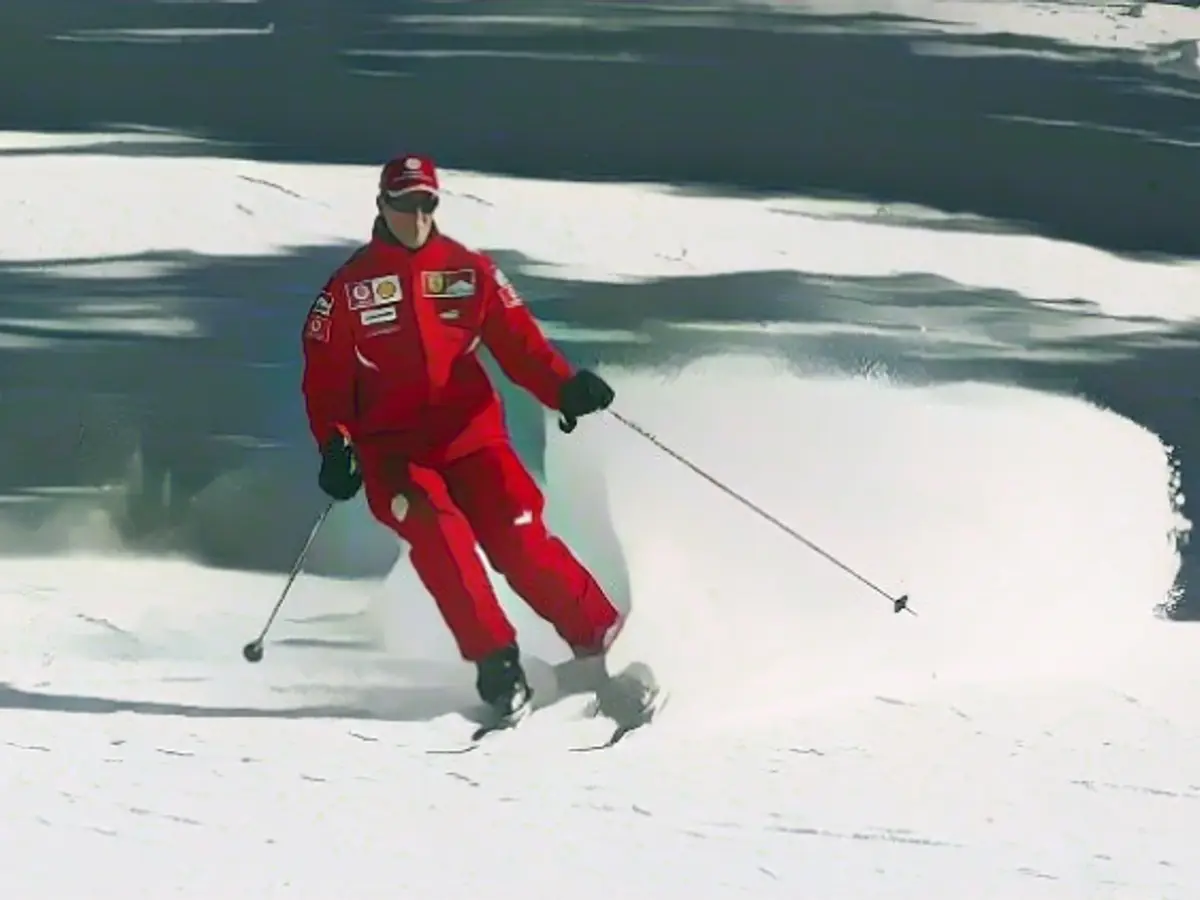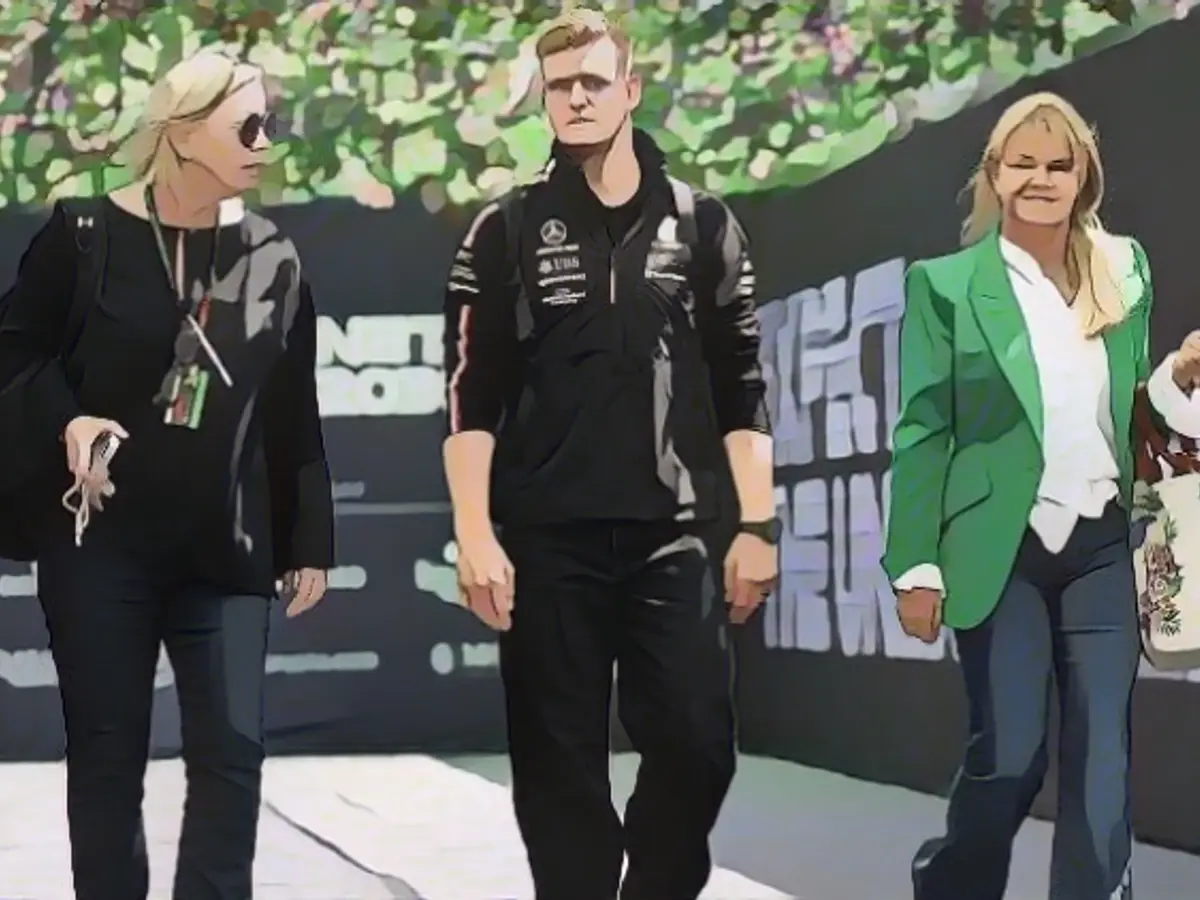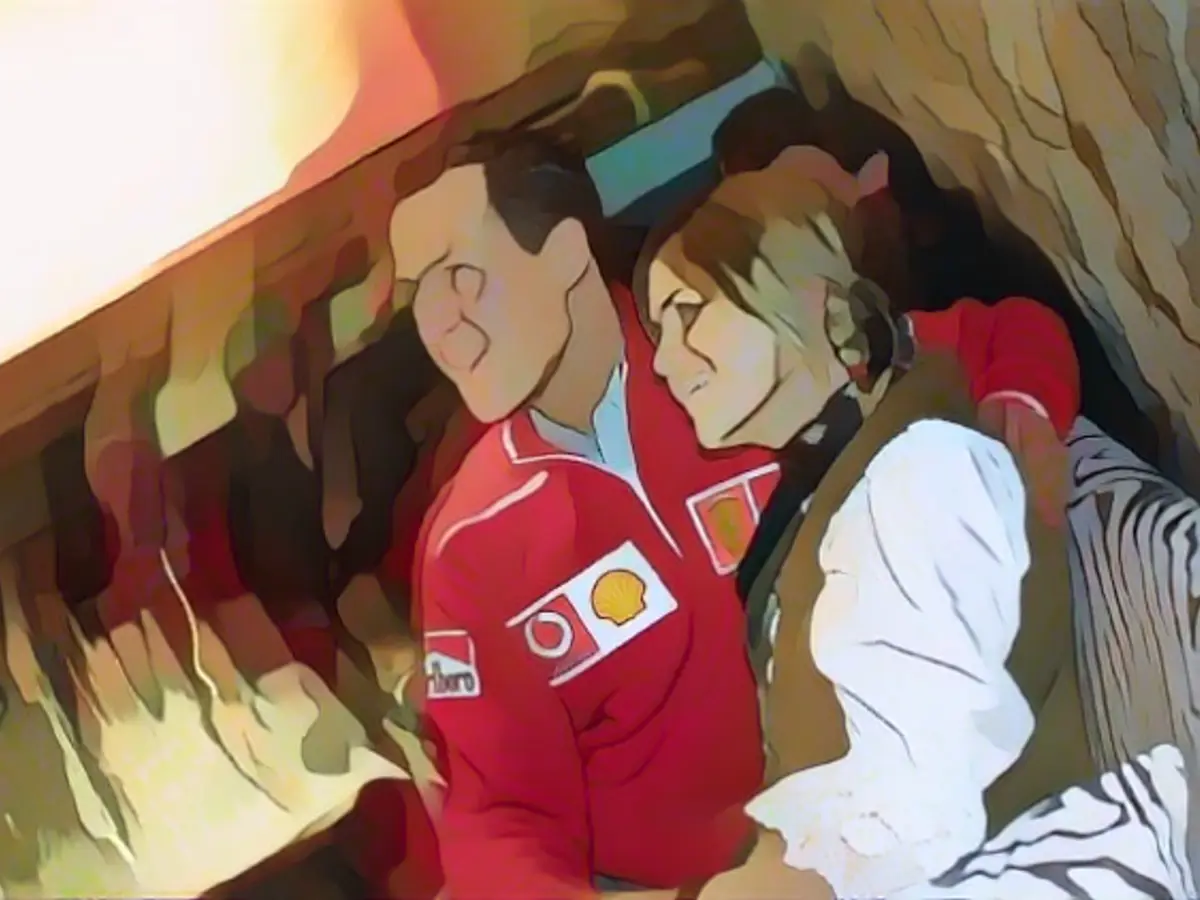Invisible Michael Schumacher is omnipresent
Ten years ago, Michael Schumacher suffered a serious fall while skiing. The record Formula 1 world champion survived, but withdrew completely from the public eye. Nevertheless, the 53-year-old is still present in many ways. There are good reasons for this.
Mick Schumacher's words resonate. Because they are so impressive, so understandable. But also so rare. "I would give up everything just for that," said the 24-year-old in a Netflix documentary about Michael Schumacher's unique Formula 1 career. And that fateful day in the French Alps, December 29, 2013, since when hardly anything has been the same.
By "that", Mick Schumacher means a simple conversation with his father: "That would be so cool." Because he assumes "that dad and I would understand each other in a different way now." Because they were both now active in Formula 1, but also "simply because we speak in a similar language", says Mick Schumacher, "this motorsport language". Because they simply "have a lot more to talk about".
These are words that provide a small insight into how much the life of the record-breaking world champion and his family has changed since the skiing accident in Méribel ten years ago today. "Of course, after the accident, the experiences and moments that many people have with their parents are not there or are less there," Mick Schumacher continues.
"Disgusting" incident in the hospital
Schumacher's life-threatening injury was the first news item in the "Tagesschau" at the time: He hit his head on a stone, the helmet saves his life according to the doctors, but cannot prevent a severe craniocerebral trauma. The then 44-year-old was flown to hospital, underwent several operations and was put into an induced coma. He remained in hospital for months and won the fight for survival.

The day after the accident, the family thanked the doctors, and his wife Corinna also addressed the "many people from all over the world who expressed their sympathy and best wishes for Michael's recovery." Schumacher is one of the few global sporting heroes from Germany, and his name is synonymous with Formula 1 for many far beyond the borders of Germany. Even then, the family asked for the seriously injured man's privacy to be respected.
Not only fans, acquaintances and relatives gathered at the hospital in Grenoble, but also journalists from all over the world. While the majority of them respect the family's wishes, some disregard them. His long-time manager Sabine Kehm describes "interesting incidents" at the clinic, including this one: "Apparently there was a person dressed as a priest who tried to get close to Michael." Kehm quite rightly calls this "abhorrent".
Unrivaled by Vettel, Hamilton and Verstappen
In the days and months that followed, the manager reported on Schumacher's progress. That he was brought out of his coma, experienced "moments of consciousness and awakening", that he was transferred from the French hospital to a clinic in Switzerland "to continue his long phase of rehabilitation". That he is back home. There is no more information about his state of health, which is both remarkable and admirable.
After all, millions of Germans have spent their weekends with Schumacher for years. On the RTL broadcasts, they cheer him on as he chases the best qualifying time on Saturday and victory in the Grand Prix on Sunday. Without ever having met him in person, Schumacher has become a perceived friend for many, an old acquaintance, a companion who sometimes vacillates between genius and madness at the wheel of his Formula 1 racing cars. He took pole position 68 times, won 91 Grands Prix, became world champion seven times and in 2002 was the only driver in F1 history to finish on the podium in every race of the season. Neither Sebastian Vettel, Lewis Hamilton nor Max Verstappen have managed this in their dominant phases.
In the less glamorous hours of his career, Schumacher fans suffer with their idol. The collision with Damon Hill in the 1994 season finale in Adelaide brought him his first world championship title, but also a lot of criticism. The collision with Jacques Villeneuve in the 1997 season finale in Jerez even led to Schumacher being removed from the drivers' standings. The serious accident including a broken leg in 1999, when Schumacher's Ferrari crashed into the tire pile at Silverstone almost without braking. Monaco 2006, when Schumacher parked his car in the rascasse and was forced to move from first to last place on the grid.
"Everyone misses Michael, but Michael is there"
"Someone hears Michael's name and immediately thinks of 'Formula 1'," says Sabine Kehm: "Only the really big names have managed that. Ultimately, Michael personifies Formula 1." What sounds like an exaggeration corresponds to reality: In Germany, he turned a marginal sport into something that was talked about in workplaces on Monday mornings. After people had sometimes set their alarm clocks on Sunday morning so as not to miss the start in Australia or Japan.
But he also made a decisive contribution to the rise of the racing series worldwide. Anyone who has dominated the premier class since then has been compared to Michael Schumacher. The Rain King, who was voted the most influential personality in the history of Formula 1 in 2020, ahead of Niki Lauda, Ayrton Senna and Bernie Ecclestone, to mark the 70th season of the series. It is not known how the 55-year-old himself will view these accolades in a few days' time, nor is his current state of health. He celebrates his birthday on January 3, as so often in a small circle.
"Private is private" was already Schumacher's guiding principle during his active career, and the exceptional athlete always kept his family life out of the public eye. "Michael always protected us," says Corinna Schumacher in the Netflix documentary, "and now we protect Michael." For her, it is "simply important that he can continue to enjoy his private life as much as possible." Even though she emphasizes "that I miss Michael every day", as does everyone around her: "Everyone misses Michael, but Michael is there, different, but he's there and that gives us all strength."
Respect is greater than curiosity
Corinna Schumacher describes the events of December 29, 2013 as "just really bad luck and you can't have more bad luck in life". Without sounding reproachful. All the more so as someone who struggles with fate, but accepts it and tries to make the best of it. As trite as that may sound. Since then, the seemingly endless solidarity with Schumacher, who left a lasting impression on so many people, has gathered under the hashtag #KeepFightingMichael.
Naturally, the interest of these many people in finding out how their former hero is doing today is correspondingly high. However, Schumacher's lawyer Felix Damm recently explained once again why there have been no official statements from the family since September 2014, when he returned home. "It was always about protecting privacy. We have discussed a lot about how this is possible. We also considered whether a final report on Michael's state of health could be the right way to do this," he told the portal "Legal Tribune Online", but "it wouldn't have been over after that and there would have had to be constantly updated water level reports."

Only in the days immediately after the accident in December 2013 was some general information given about the injuries in order to take some pressure off the situation. "But I also believe that the vast majority of fans can handle it well and respect the fact that the accident set a process in motion in which the private safe space is necessary and will now continue to be observed," Damm explained. And indeed, the public discussion about Schumacher is, in the vast majority of cases, characterized by understanding for this approach. Anyone who speculates is criticized. Respect is greater than curiosity.
This can also be seen in the public treatment of Mick Schumacher. He was on the ski slope with his father at the time, but he no longer has to answer questions about this fateful day, he is not even asked them. As a Formula 3 and Formula 2 champion, he was promoted to the premier class and, in his two years as a regular driver at Haas, was in the spotlight because of his name alone. Mick is always also "the son of the record-breaking world champion". The acceptance that the family wants to keep his rehabilitation private can be felt everywhere.
The fascination with Schumacher is unbroken
Probably also because Michael Schumacher has always seemed approachable despite his successes and the millions he has earned from them. With the Rhenish dialect, the broad grin, perhaps also the distinctive chin and the resulting unmistakable silhouette. With the tears when he equaled the mark of his idol Ayrton Senna with his 41st victory in Monza in 2000. Tears also flowed in 2003 after the triumph in Imola. Between qualifying and the race, the brothers Michael and Ralf had moved home overnight because their mother Elisabeth had died aged just 54. "She would have wanted us to drive this race, I'm sure of it," Michael Schumacher announced shortly afterwards.
The several-hour RTL farewell broadcast from 2006, when Schumacher had ended his Ferrari career and his Mercedes comeback in 2010 was not yet in sight, has already been viewed almost a million times on YouTube. The comments express the collective admiration for the racing driver. One person writes what is probably true for so many: "After so many years, this person still stirs up so many emotions in me." Michael Schumacher is moving.
The sympathy and attention for the former dominator is correspondingly high on the anniversary of the terrible accident. This is always accompanied by many questions, but there is no claim to answers. Perhaps Schumacher could have made a second career as a TV pundit or advisor to Formula 1 teams, as the iconic Niki Lauda did with his almost even more iconic red cap. Perhaps he would have accompanied Mick on his rise through the junior series to the racetracks of this world.
But then came December 29, 2013, the day in the French Alps when everything changed. The day Michael Schumacher disappeared from the public eye. And yet it did nothing to change the fascination and admiration that so many feel for him.
Read also:
- NFL kicker out injured, then something unbelievable happens!
- Taylor Swift talks about love for her NFL star
- Crazy victory in the NFL top game
- NFL star breaks referee's leg
Despite his seclusion, Michael Schumacher's influence in Formula 1 remains undiminished. His son, Mick Schumacher, currently a Formula 1 driver, shares an appreciation for the 'motorsport language' they both share, wishing for deeper conversations about their shared passion for racing since his father's accident in 2013.
Former long-time manager Sabine Kehm recalls the strong interest of journalists after Michael's accident, including an "abhorrent" incident in the Grenoble hospital, where a person disguised as a priest attempted to approach Michael.
Mick Schumacher's words resonate because they express a deep longing to engage in meaningful discussions with his father about their shared love for 'motorsport' in the unique 'motorsport language'. Sabine Kehm, his long-term manager, remembers the inappropriate behavior of some journalists in Michael's hospital during his recovery following the skiing accident.
Source: www.ntv.de








